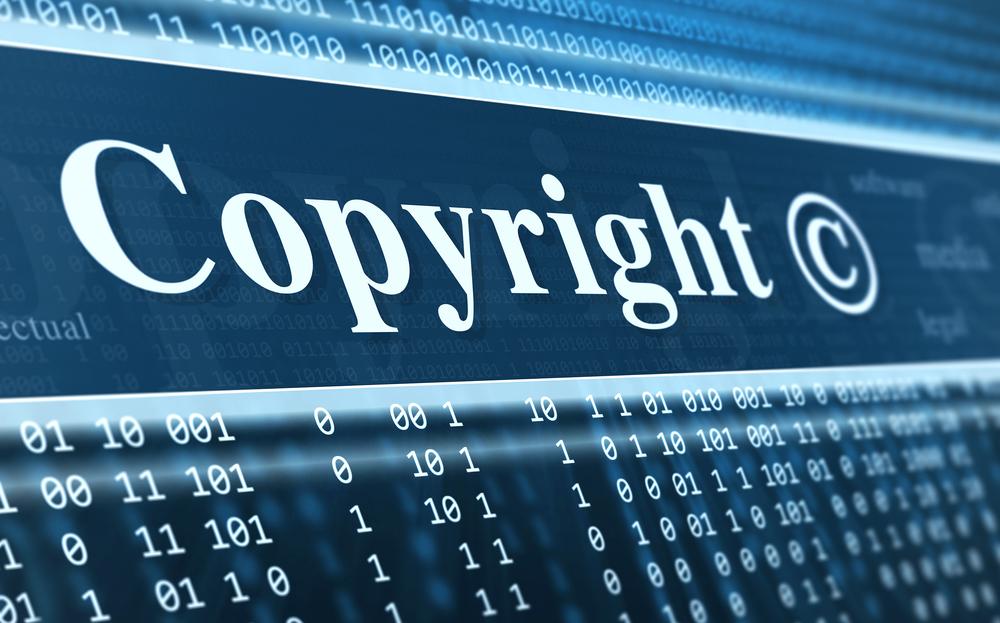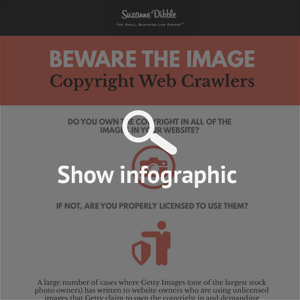
Do you own the copyright in all of the images in your website?
If not, are you properly licensed to use them?
Are you sure?
What about those ones that your website designer in India used? Or those ones that your Virtual Assistant added for you? What about images used on banner adverts on your website?
Well, this is serious stuff as I have heard of a large number of cases where Getty Images (one of the largest stock photo owners) has written to website owners who are using unlicensed images that Getty claim to own the copyright in and demanding anything from £800 to £3600 for breach of copyright in the image. Apparently, they use Picscout, a clever bit of software to crawl the web and which can detect images, even if they have been amended, resized or cropped.
You can read an example of such a letter here (this is one that has been sent in the US and is under US law).
The Getty Letter is written in an aggressive way and presumes your guilt, expecting you to prove your innocence. The letter also states that even if you are unaware of the infringement or did not intend to infringe the copyright, you are still liable for all alleged “damages and liability”.
But what is the legal status of Getty’s heavy handed demand letters?
Well although it is true that innocence is no defence to a copyright claim, if the matter ever went to court in the UK, a judge would take into account whether or not the infringement was intentional in assessing the damages to be paid.
If you did intentionally use an image without regard to paying a royalty for its use, a UK court may award enhanced damages. The judge would also consider how exclusive the image is, how widely it has been viewed and how long it has been on the site. The main consideration however would be how much it would have cost you to have purchased a license to use the relevant images.
So in terms of the “damages” being sought, which I understand to be anything from £800 to £3600 for the use of a single image, that is significantly more than a UK court would be likely to award as damages for Getty’s “loss”.
If you are unlucky enough to receive a letter from Getty Images (or any other stock photo image organisation) claiming infringement of their copyright and you can’t prove that you were duly licensed to use the image get a free solicitors advice of follow what I suggest you do:
1. You write back to them asking them to prove their copyright ownership in the relevant image.
2. If they prove they own it, then take the relevant image down and write to Getty (or whoever sent the letter) explaining that you innocently infringed the copyright (if that is true…), asserting that you believe that court assessed damages would be in the region of £30 (or whatever the license would have cost) and offering them that sum in compensation in full and final settlement of any claim for breach of their copyright in that image, but making it clear that you are not admitting liability.
When you are contracting with web designers, virtual assistants or anyone else who may be responsible for sourcing images for your website, make sure that:
1. You are upfront with contractors about them not using copyright protected images without you being licensed to use them (note, it is not sufficient if only they are licensed to use the image – you need to be licensed too).
2. If they do use any images, check with them again where they sourced the images from and that you are duly licensed to use them (or ideally provide them with access to your stock photo account and ensure they only use images from there).
3. Put in place a contract that states that if the contractor doesn't own the IP in the deliverables (including images) that he or she will license you to use the IP and warrants that he or she is entitled to grant such a license. There should also be a provision that states that if the contractor does infringe a third party’s IP, he or she will indemnify you (i.e. reimburse you) for any loss you may suffer as a result of that infringement.
Note however that offshore contractors that you find on Elance, Fiverr or similar will be reluctant to sign a legal agreement and in any event, it will be very difficult to enforce the agreement in a jurisdiction outside of the EU – so the upfront checking at points 1 and 2 above become even more important.
If you need any help with putting a freelance/sub-contractor agreement in place that will protect you as set out above and provide a heap of other protections for you, you may want to consider joining my Legal Academy that includes a watertight freelance agreement and pretty much every other legal resource you could need. To see more click here.
So go and check right now whether you own or are licensed to use each image that you are using on your website and if in doubt, take it down. Yes, right this minute…
© Suzanne Dibble 2013-2022
Disclaimer: The information contained above is based on English law only and is provided for information purposes only. The contents of this article are not intended to amount to advice and you should not rely on any of the contents of this article. Professional advice should be obtained before taking or refraining from taking any action as a result of the above contents. Suzanne disclaims all liability and responsibility arising from any reliance placed on any of the contents of this article.













